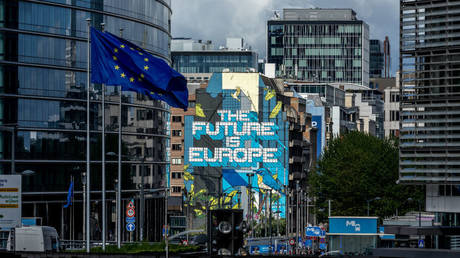
EU slaps first sanctions on Russian LNG
Re-exports of liquified natural gas have been banned in the 14th package of restrictions
The European Council has adopted its 14th round of economic and individual sanctions against Russia over the Ukraine conflict, the bloc’s executive body announced in a press release on Monday.
The measures target “high-value” sectors of the Russian economy, such as energy, finance, and trade, the statement says. The bloc also seeks to prevent Moscow and its trade partners from bypassing EU sanctions, the council added.
The EU has for the first time targeted liquified natural gas (LNG) of Russian origin. Re-loading operations, ship-to-ship transfers, and ship-to-shore transfers with the purpose of re-exporting to third countries via the EU have been banned.
The restrictions do not affect imports of Russian LNG for use within the bloc, the statement added. The country emerged as a leading supplier of LNG to the bloc after the flow of pipeline gas plummeted in 2022 in the fallout of the sanctions campaign and the sabotage of the Nord Stream pipeline, which had been the main conduit for Russian gas into the EU.
Read more
Scholz admits many Germans are unhappy about Ukraine aid
Among other measures are curbs on exports of goods that the EU believes contribute to the enhancement of Russian industrial capabilities, such as chemicals, including manganese ores and compounds of rare-earths, plastics, excavating machinery, monitors, and electrical equipment.
The EU has also tightened export restrictions on dozens of entities in third countries such as China, Kazakhstan, Kyrgyzstan, Türkiye, and the United Arab Emirates over the alleged supply of dual use goods and technologies to Russia.
An import ban has also been placed on Russian helium – a critical component in many industrial processes such as manufacturing fiber optics and semiconductors.
In the financial sector, the European Council moved to ban Russia’s equivalent of the SWIFT banking system. The System for Transfer of Financial Messages (SPFS) was set up by the Russian central bank after the country was cut off from SWIFT as part of previous sanctions.
Restrictions have also been placed on 116 individuals and entities that are deemed to be involved in the situation regarding Ukraine.
READ MORE: Japan slaps sanctions on Chinese firms over alleged Russia links
Moscow considers the sanctions to be illegal. President Vladimir Putin said last week that Western countries “are trying to wear down the Russian economy” and “provoke an increase in social and political tension” in the country, though their attempts have been futile.
When it was announced in April that the 14th round of sanctions would target Russian LNG, Kremlin spokesman Dmitry Peskov responded by saying Western nations are shooting themselves in the foot. Russia will “try to minimize the consequences” and protect its national interests, he added.
